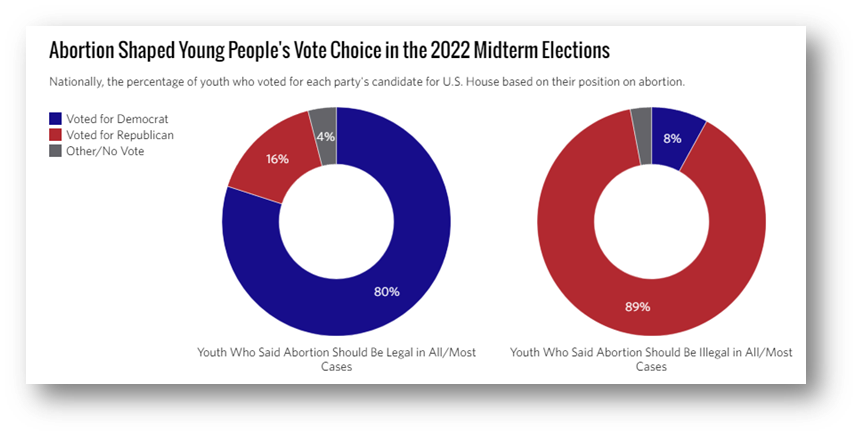YOUTH APATHY? NOT SO FAST...
One of the biggest misconceptions about Gen Z is that they don’t vote because they don’t care.
“Hi! Are you registered to vote?”
That was my one-second pitch to register voters at this July’s First Friday festival in downtown Phoenix.
“Uh, no,” the person would often say, walking away.
“Would you like to be?” I’d quickly respond.
And many would reply with, “Uh, no.”
“Why not?”
Sometimes, as is expected with registration canvassing, the person I was talking to would simply walk away. But more often than I expected, they would stay to talk–and their response usually sounded a lot like this:
“I don’t like Biden and I don’t like Trump. Why would I register when I don’t want to vote for either?”
And I would reply:
“There are so many things you can vote on besides the presidential race. You know the 1864 abortion ban? You can actually vote on whether to keep the judges who made that decision this November.”
That’s when the person I was talking to would scan my QR code to register.
Youth apathy increases post-presidential debate
As headlines swirl detailing the painful June presidential debate, it is easy to feel like youth voter apathy is at an all-time high. Rachel Janfaza, founder of The Up and Up, told TheWrap that the debate “highlighted this gerontocracy,” as the ages of both candidates sparked widespread concern. Her sentiment is echoed by young voters in particular. A recent poll from The New York Times and Siena College found that 84% of respondents 18-29 feel that Biden is too old to be an effective president, and only 36% are certain that they will cast a vote in November.
The negativity surrounding the presidential election is causing many activists to feel panicked about youth voter turnout, especially in swing states like our own. Arizona’s youth electorate will be crucial in determining wins up and down the ballot this November. In 2022, young voters were key in delivering wins for progressives with tight races. Governor Hobbs, who won her race with just .7% of the vote, received support from 71% of voters ages 18-29. Similarly, 76% of these voters voted for Senator Kelly, who beat his opponent by less than 5%. Clearly, when Arizona youth vote, candidates with progressive values win. How can we convince our disillusioned generation to vote when they don’t want to?
Young voters care, but we must meet them where they are
One of the biggest misconceptions about Gen Z is that they don’t vote because they don’t care. Just like the person at First Friday, many young people don’t connect the issues that they care about to the candidates on their ballots.
Many voters in their teens and twenties feel powerless and unrepresented by the two candidates at the top of the ballot, and mainstream news gives little attention to the candidates for state and local offices, who wield tremendous impact on our daily lives.
This is where we as individuals who understand the importance of state legislators, school board members, and judges must act. Young voters care deeply about the issues–especially abortion. In fact, voters under 30 named abortion as the top issue influencing their vote in the 2022 midterms. They were the only age group to do so. Despite this passion, many young people have no idea how critical their local offices are in determining abortion access. In order to turn out one of Arizona’s most important electorates, we must shift the conversation away from the presidency and towards state and local elections.
“Inflation won against every issue [in a head-to-head matchup] except reproductive rights.” - Harvard Kennedy School Spring 2024 Youth Poll
We can impact abortion access, and there’s so much more to do
Just like I told the attendees at First Friday, we can vote for our judges. This process is called judicial retention, and it’s something that CEBV co-founder Cathy Sigmon follows closely.
“Arizonans are incredibly fortunate that judges answer to us, the people, to make sure they are delivering judgments that respect our rights and needs,” Sigmon said when asked about the importance of judicial retention. “Just a glance at the US Supreme Court, which ended decades of a woman's right to abortion and exploits lax ethics rules for personal gain, shows what an unaccountable judiciary looks like.”
This is especially important because our judiciary impacts our lives quite extensively. Sigmon affirms this: “95% of all cases are decided at the state, not federal, level and each and every one of us will come in contact with our judiciary at some point in our lives--they decide child custody, bankruptcy, business disputes, evictions, all the way to a woman's control of her body and discrimination against LGBTQ+ members of our community.”
Judicial retention is incredibly important–this can’t be overemphasized. And it’s under attack: Proposition 137 on the November Arizona ballot threatens to take away our right to vote on our judiciary.
Abortion is many young voters’ top issue, and their votes go a long way in deciding what that right will look like in the future. Our youth must vote – all the way down through the judges and propositions. And it’s a veritable feast of issues that young people care deeply about.









